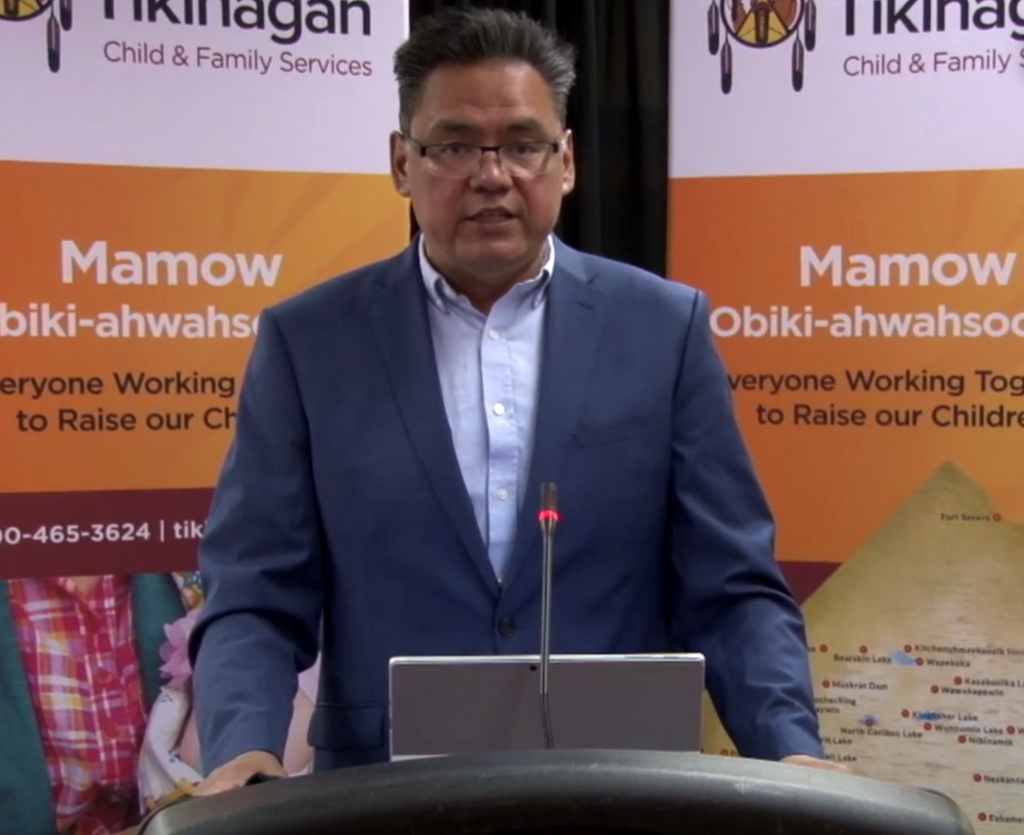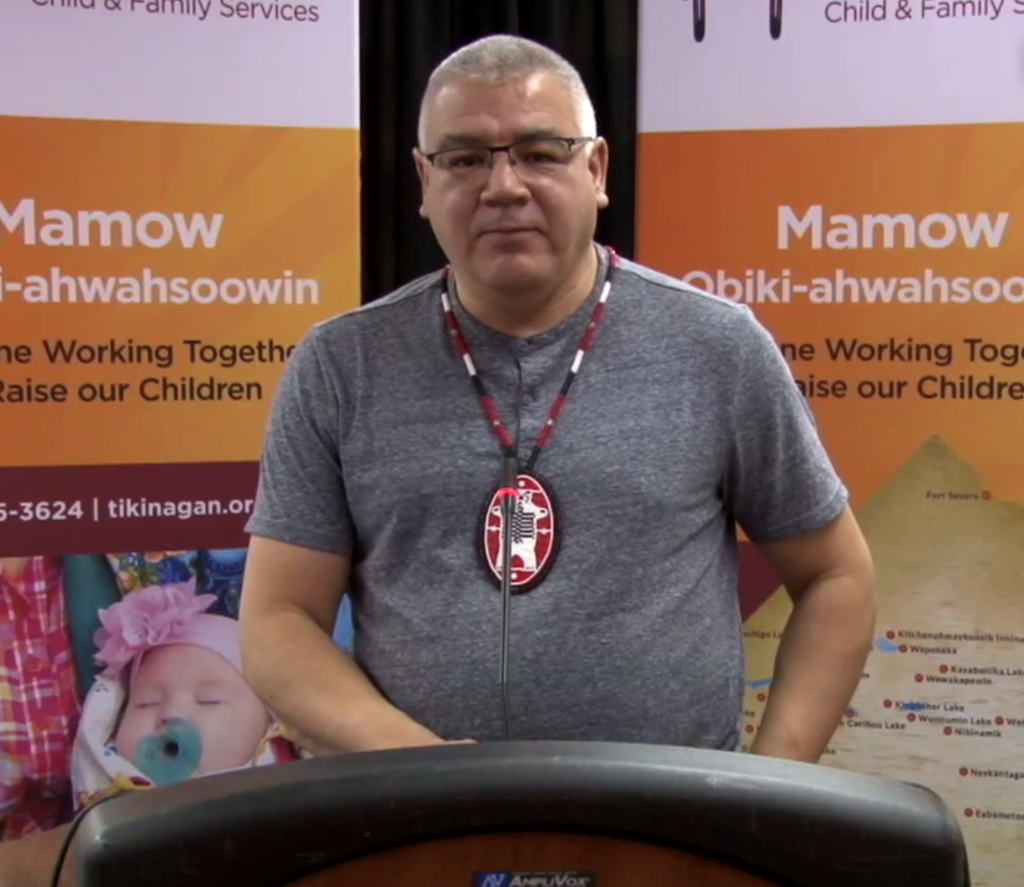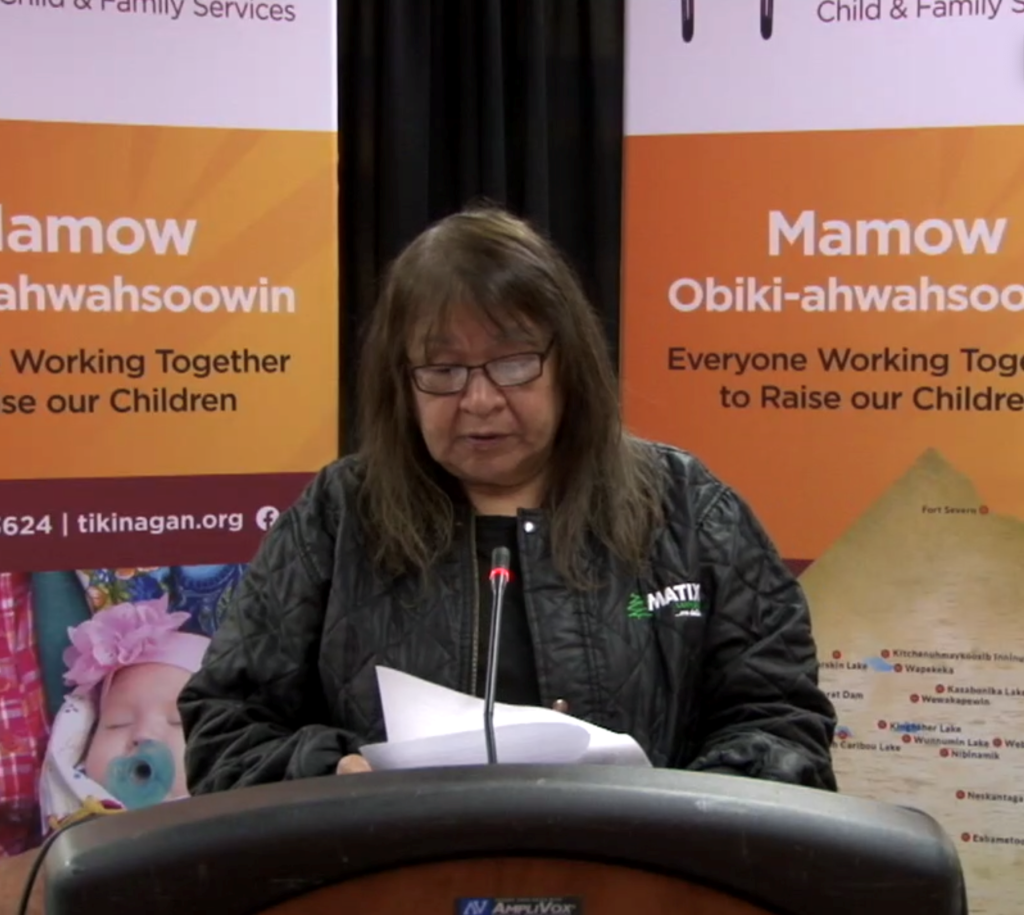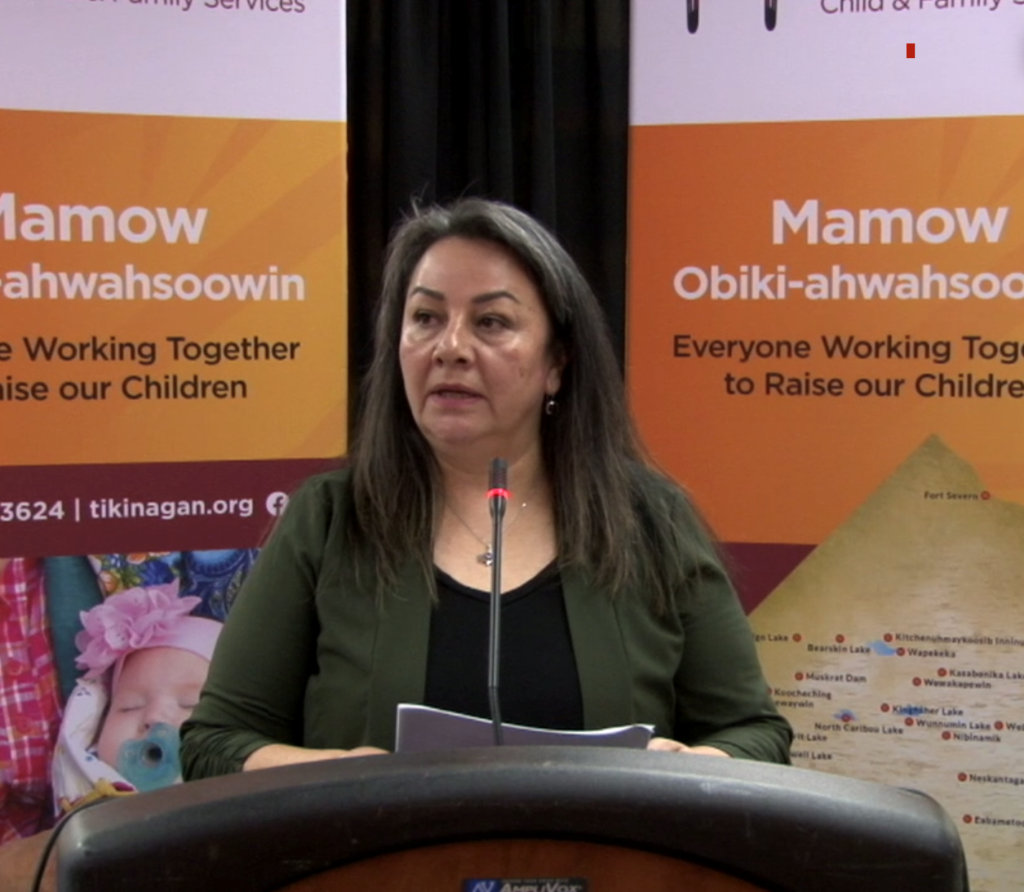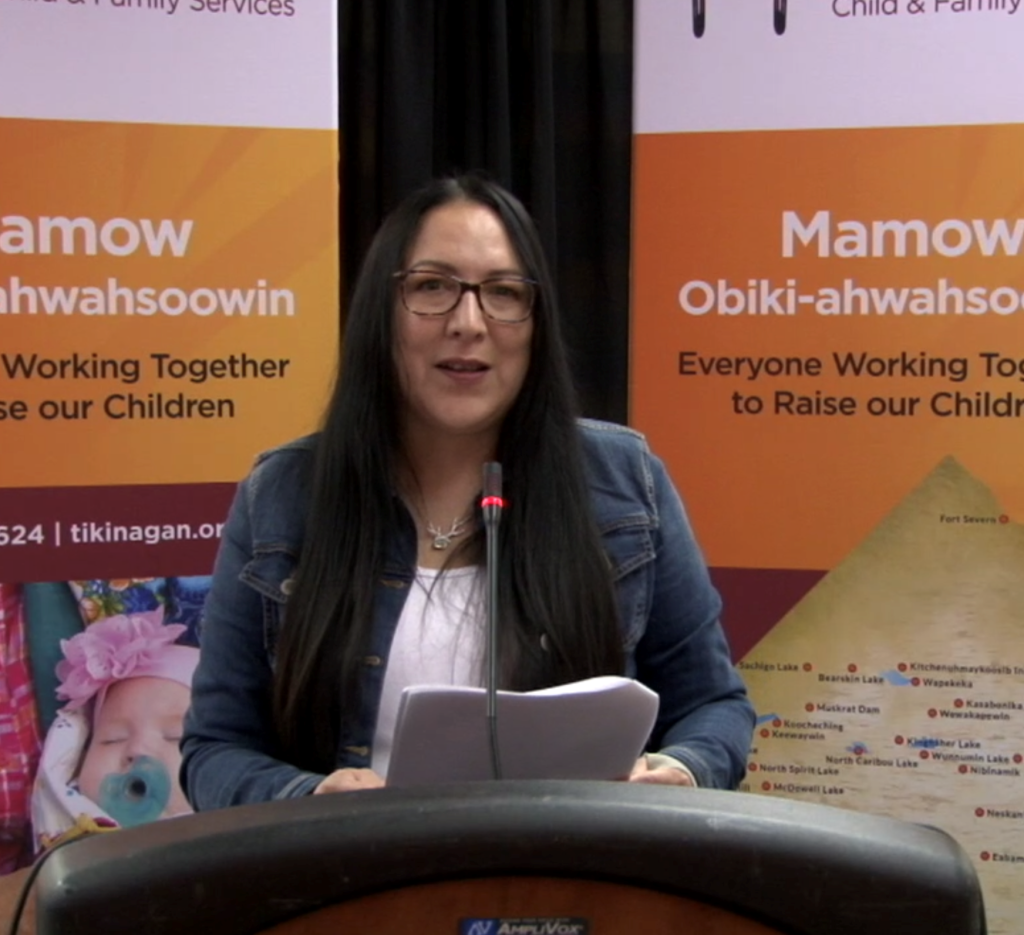Tikinagan trail-blazes again, begins work on Niigaanshkaawin
Tikinagan trail-blazes again, begins work on Niigaanshkaawin
Mamow Obiki-ahwahsoowin, Tikinagan’s service model which means “everyone working together to raise our children,” has always been seen as a trailblazer in allowing First Nations to exercise their rights around how they want their children and families supported. Now, the agency is taking another step as a leader in child welfare approaches.
At the Tikinagan Child and Family Services Annual Chiefs Assembly held virtually last week, Tikinagan Executive Director, Thelma Morris presented on a proposal called Niigaanshkaawin. The name, which means “walking ahead or first to walk ahead” aptly describes the goal to have Tikinagan break trail on a new, proactive path to support and integrate Band Representative programs and First Nation law making. At the Assembly a resolution was passed to form a new Chiefs Committee to oversee a process to determine the role of the agency in the future with wide-ranging changes in the child welfare landscape.
“We chose the name Niigaanshkaawin because Tikinagan has always led the way,” explained Morris. “I have always said we are two-steps ahead of everyone in Ontario. This can be the base for child welfare laws in Ontario. My dream is for each First Nation to have their own child welfare laws.”
Nishnawbe-Aski Nation (NAN) Deputy Grand Chief Bobby Narcisse NAN Deputy Grand Chief Victor Linklater Lorraine Crane, Slate Falls First Nation Chief and Tikinagan Board Chair Thelma Morris, Tikinagan Executive Director Rachel Tinney, Tikinagan Associate Executive Director
Morris said the field of child and family services is changing dramatically. On June 21, 2019, the federal government passed Bill C-92, An Act Respecting First Nations, Inuit and Métis Children, Youth and Families. This legislation has the goal of keeping Indigenous children and youth connected to their families, communities and culture. This bill will transition Tikinagan’s role in some communities from a position of child welfare leadership to a more supportive role in developing and enacting their own child welfare laws that align with their community’s culture and history. The new Tikinagan Chiefs Committee will consult with community members and leaders to determine the specific role communities want the agency to fill. These consultations will allow Tikinagan to prepare to support in whatever way each community sees fit.
“Over 30 years prior to this legislation and the Truth and Reconciliation Calls to Action, Chiefs in our communities dreamt of having a child and family services agency that would deliver services respectful of the culture and customs of the Indigenous people. With the development of Mamow service model in the last 20 years or so, we at Tikinagan have been able to work alongside First Nations to practice their inherent rights in making key decisions around care and provision of services to families in child welfare service.”
Nishnawbe-Aski Nation (NAN) Deputy Grand Chief Bobby Narcisse echoed these ideals in his address, encouraging the Chiefs and Delegates that everyone needs to work together when it comes to raising our children.
“We are here to support our families in regards to child welfare,” he said. “We encourage our First Nation communities to work with Tikinagan to ensure we maximize the resources at our community level.”
After more than 15 years working in child welfare, NAN Deputy Grand Chief Victor Linklater said one of his biggest passions has always been putting children at the centre of the work being done by agencies like Tikinagan.
“I encourage leadership in our communities: let’s work together, let’s protect children, rebuild our families and have strong communities,” said Linklater.
Nishnawbe-Aski Nation (NAN) Deputy Grand Chief Anna Betty Achneepineskum showed her support for work done by Tikinagan.
“I continue to see families that need Tikinagan and others to make sure they have homes, medical and other resources. Thanks to Tikinagan staff and other resources to support families and keep them safe.”
Lorraine Crane, Slate Falls First Nation Chief, provided her report as Tikinagan Board Chair. Throughout the uncertainty of the pandemic, she highlighted how Tikinagan remains committed to supporting families.
“As we all remain socially distanced, you can take great comfort in knowing your agency is working diligently to keep families safe and connected,” said Crane. “I hope when this pandemic comes to an end, we are all able to come together to celebrate what we gained and honour who we lost. I hope we will continue to hold what we learned such as stronger family values and togetherness in our hearts. Until this time comes, stay connected, keep safe and follow the rules, as we are all role models. Tikinagan is always here for support and guidance to our families.”
In her annual report message, Morris shared her passion for caring for children, supporting her own family and the families in Tikinagan’s communities. By leading by example, Morris wants to see our children and families healthy and see our families and communities work together.
“I want Tikinagan to be seen as an ally or helper with resources and support,” said Morris. “I am open to listening and hearing from families and communities about how we can help them become better, stronger, and healthier. By working together, we can improve the lives of our families and communities.”
Rachel Tinney, Tikinagan Associate Executive Director, said the staff miss travelling to the communities they serve and meeting in-person.
“As an essential service, we have remained a consistent support for our families and communities during the COVID-19 pandemic and the key to this was our community-based staff. We rely on them a lot, especially when communities are in full lock down to prevent further spread of the virus.”
Kitchenuhmaykoosib Inninuwug First Nation Chief Donny Morris, representing the Tikinagan Chiefs Committee, provided an update on the transition to serving families connected to Tikinagan-affiliated First Nations in the city and district of Thunder Bay. The Chiefs of this region repeatedly directed Tikinagan to provide Mamow Obiki-ahwahsoowin services to their members in the Thunder Bay area. The Tikinagan Chiefs Committee was mandated by the Chiefs to achieve this goal and through their hard work and advocacy, the Ministry designated Tikinagan to provide services in the Thunder Bay area effective January 30, 2020. Chief Morris highlighted the progress of this huge undertaking and indicated transfers of families and children in care to Tikinagan are now almost all completed. Chief Morris says the committee is pleased to have been able to help our First Nations achieve this goal.
With the one-day assembly taking place virtually, more than 30 First Nation delegates and guests attended from their own communities.
To start and end the assembly in a good way, we were grateful to have Board Elder Emily Gregg do the opening prayer and Board Member Jim Bottle closing the meeting in prayer. We were honoured to also have Victor and Romaine Lyon open and close the assembly with drum songs.
Download the 2019-2020 Annual Report | Download the 2020-2021 Annual Report


